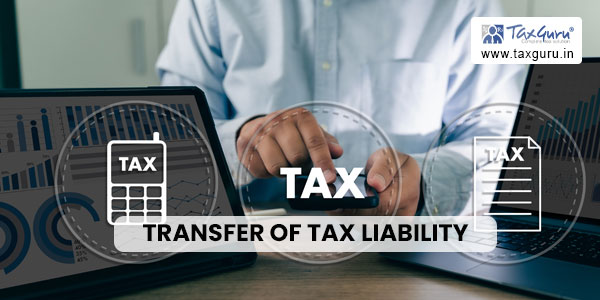Explore the intricate provisions of GST related to the transfer of tax liability in situations where direct collection from the taxpayer is challenging. Understand the rules from business transfers to cases of death, insolvency, and more. Stay informed to ensure compliance and avoid potential litigations.
Provisions Under GST Relating to Transfer of Tax Liability When the Same Can Not Be Collected from The Taxpayer Directly
In the complex world of taxation, understanding the provisions related to the transfer of tax liability is crucial. Under the CGST Act, sections 85 to 94 specifically outline the rules and regulations governing this transfer, particularly when the amount due under GST cannot be recovered from the taxpayer directly. This article delves into the various scenarios where such transfers are applicable, from business mergers to individual cases of death or insolvency.
Section 85 to 94 of the CGST Act prescribes the legal provisions relating to transfer of tax liability from one person to another in some typical circumstances described below. Such provisions come into force when there is an amount due under GST (tax, interest, and penalty) which cannot be recovered from the taxpayer directly. The analysis of sections 85 to 94 of the CGST Act reveals a structured approach to dealing with the transfer of tax liability in a multitude of scenarios:=. Let us understand the GST provisions on transferability of tax liability in the following circumstances.

1. Liability in case of transfer of business (Section 85): The taxable person (transferor) and the person to whom the business is transferred (transferee) will be liable, jointly and severally, wholly or to the extent of such transfer, to pay the GST due. The transferee will be liable to pay GST from the date of transfer. It is immaterial if such tax, interest, or penalty has been determined before or after the transfer, as long it is unpaid. If the transferee carries on the business in a new name (which is different from original) then he must apply for amendment of his registration certificate.
2. Liability of agent and principal (section 86): If an agent supplies or receives any taxable goods on behalf of his principal, then both the agent and the principal will be liable to pay GST, jointly and severally.
3. Liability in case of Amalgamation or merger of companies (Section 87): The two or more companies amalgamated/merged are individually responsible for their taxes. If two or more companies merge/ amalgamate due to the order of a court/ tribunal when the order is to take effect from a date earlier to the date of the order (i.e., retrospective effect), and the companies have supplied goods/ services to each other during that period (from order date to order effect date), such companies shall be treated as distinct companies under GST till the date of the order (and not order effect date). Their registrations will get cancelled on the date of order.
4. Liability in case of company in liquidation (Section 88): When any company is being wound up and a person is appointed as receiver of any assets of such company, that appointed person is required to inform to the Commissioner, of such appointment within 30 days after his appointment. The Commissioner is required to notify within 3 months from the date of receipt of such intimation, the amount which would be sufficient to provide for any tax and other dues of the company. The company is liable to clear the dues within 3 months of receiving intimation from the commissioner. If the company fails, the directors are jointly and severally liable to clear the whole dues. If some of the directors are unable to clear the dues, rest of the directors are liable to clear it fully. However, if they prove that the non-payment of taxes was not due to their personal negligence, then they will be exempt from the liability of paying the company’s taxes.
5. Liability of the directors of a private company (Section 89): Where dues cannot be recovered from a private company, then its directors who were in office during the period when the tax was due will be held liable for payment of such tax, interest or penalty, unless they prove to the satisfaction of the Commissioner that such non- recovery cannot be attributed to any gross negligence, misfeasance or breach of duty on their part in relation to the affairs of the company. Nothing has been mentioned in the GST Act regarding conversion/ transfer of a private company to public company. As a result, section 89 provisions do not apply when a private company is converted to a public company.
6. Liability of partners of a firm/LLP (Section 90): Where any firm (including LLP) is liable to pay any tax, interest or penalty under this Act, the firm and each of the partners of the firm shall be jointly and severally liable for such payment. Normally, partners have limited liabilities in LLPs. But the GST Act overrides all other laws and the partners become jointly and severally liable for the entire GST dues. Commissioner must be informed by the firm or the retiring partner in case of retirement of a partner. The retiring partner could be held liable for dues under GST until the date of his retirement. If any intimation regarding the retirement is not given within 1 month, the retiring partner will continue to be held liable till such intimation is received by the Commissioner.
7. Liability of guardians, trustees, etc. (Section 91): Tax, interest or penalty shall be levied upon and recoverable from both the guardian/trustee/ agent and the beneficiary (minor/incapacitated person). The due amount can be recovered from both parties.
8. Liability of Court of Wards, etc (Section 92): If the business owes any amount under GST, then the Court of Wards, the Administrator General, the Official Trustee or any receiver or manager will be held liable along with the taxable person.
9. Liability after the Death of the Taxpayer (Section 93): If the business is carried on by the legal heir/ representative, then the heir/ representative will be held liable for the unpaid dues under GST. If the business is discontinued, whether before or after the death of the taxpayer, the legal heir will be liable to pay the due amount out of the estate of the deceased.
10. Liability of Partnership Firm on Dissolution (Section 94): In case of dissolution of a partnership firm, each partner will be liable jointly and severally for any GST amount due up-to the date of dissolution.
11. Liability of HUF/AOP on Partition (Section 94): When the property of the HUF/ AOP is divided amongst the various members, then each member or group of members will be liable for all GST dues up-to the time of partition, jointly and severally.
12. Liability when a Trust is Terminated (Section 94): If the guardianship or trust looking after the business for a beneficiary and paying tax under GST is terminated, then the beneficiary will be held liable for all unpaid GST dues.
13. Liability in cases of Reconstitution of Firm/AOP (Section 94): In case of reconstitution of a firm/AOP, all the partners/ members who were there before the reconstitution will be held liable jointly and severally for all dues up-to the date of reconstitution.
Conclusion: There can be several such situations, when it becomes impossible to collect tax dues under GST from a taxpayer. This may be any situation enumerated in above examples. But government is very much keen about collecting tax dues in every situation as seen under various circumstances discussed above. Side by side, government has enacted the provisions under GST law to fix the liability of tax dues in every such typical situations like business closure, transfer, death of business owner, etc. So, it becomes immensely important for us to understand these provisions to determine of our accurate GST liability and escape from any kind of future tax litigations with the department.





